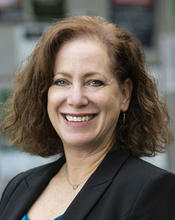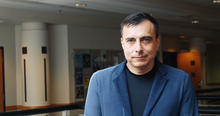- December 1, 2022
George Mason University’s Business for a Better World Center (B4BW) recently convened an in-person Stakeholder Roundtable on the subject of Corporate Governance. The half-day event took place at Point of View International Retreat & Research Center at Mason Neck in Lorton, VA on October 21.
- November 29, 2022
Mehmet Altug, an associate professor of operations management, has been researching retail returns policies for a decade. The issue has recently come to prominence, as the lenient policies of online retailers have led to skyrocketing return rates (now exceeding 20 percent in the U.S.). Altug’s various academic papers delve into the difficult trade-offs retailers face when setting returns policies. While there are no easy answers, Altug’s research identifies factors that can help retailers achieve more strategic flexibility.
- November 10, 2022
On the morning of Wednesday, October 26th, George Mason University professor Suzanne C. de Janasz conducted her first-ever negotiations workshop for female high school students at McLean High School in Northern Virginia. An enthusiastic audience of about 100 young women came to hear de Janasz explain why negotiation is important for women of all ages and walks of life, and how to build negotiating skills for the future. De Janasz, an organizational researcher who holds a joint appointment in the School of Business and the Carter School for Peace and Conflict Resolution, says there is a pervasive cultural bias against women who ask for what they deserve. The negative labelling begins in childhood, with terms such as “bossy” being applied to more assertive girls.
- October 19, 2022
For most drivers in the U.S., obeying a stop sign upon approaching an intersection is an unavoidable annoyance. But for Mason finance professor Jiasun Li, it’s a problem waiting to be solved. His recent working paper proposes a simple and economical improvement: removing one stop sign from every four-way intersection. According to his calculations, this would boost not only driver safety, but environmental sustainability as well.
- October 12, 2022
Corporate social responsibility (CSR) has been on the business leadership agenda for more than 50 years, yet executives and corporate boards still demand to see the "business case" for CSR. Clearly, CSR’s familiarity as a concept has not translated into coherent ideas of where it fits into the cost-benefit calculations that motivate business strategy. A forthcoming article in the Journal of Financial and Quantitative Analysis by Lei Gao, associate professor of finance at George Mason University School of Business, Jie (Jack) He (of University of Georgia) and Juan (Julie) Wu (of University of Nebraska – Lincoln) goes beyond the business case to form cause-and-effect connections involving companies’ CSR efforts.
- October 6, 2022
Since 2019, George Mason University’s Business for a Better World Center (B4BW) has led the university’s contribution to the United Nations Principles for Responsible Management Education (PRME) North America chapter.
- September 28, 2022
As Jenelle Conaway, assistant professor of accounting at George Mason University School of Business, says, “Being able to compare companies more easily makes for more efficient investment choices. And that scales from the individual level up to banks choosing who they lend to, and companies choosing who they want to merge with and acquire.” Her recent research finds that comparability trends have grown complicated.
- September 26, 2022
Jingyuan Yang, an assistant professor of information systems and operations management at Mason's School of Business, is at the forefront of AI research that aims to crack the codes of the physical world. Her results so far point toward innovative solutions for some of the biggest societal, governmental, and business challenges we face.
- September 22, 2022
Exceptions may prove the rule, but they must first be explained. That is why finance researchers are drawn to the distress anomaly-- a well-documented phenomenon that challenges the risk-return paradigm in equity markets. Generally, higher-risk investments are expected to yield higher returns than safer, more stable securities. In recent years, however, studies have shown that high-credit-risk securities for companies in distress – i.e. when their already-low credit rating is being downgraded -- realize abnormally low returns compared to non-distressed securities of the same or lower risk. Academics have proposed a range of rationales for this puzzle. Alexander Philipov, finance area chair and associate professor at George Mason University, says they mainly fall into two categories.
- September 20, 2022
Selling is inseparable from relationship management. In the past, the one-to-one "human touch" of a salesperson compensated for the standardized nature of their wares. However, today's sales environment tends towards customized solutions and co-creation with the client, especially in the B2B space. In many cases, these trends have greatly increased the network of stakeholders whom salespeople are obliged to keep happy. Research shows that B2B customers benefit from being more involved in the process, but what about the sales force? Does their increased interpersonal burden translate to higher risk of burnout? George Mason University School of Business Marketing Area Chair Jessica Hoppner's recently published paper in Industrial Marketing Management, co-authored by Paul Mills of Cleveland State University and David A. Griffith of Texas A&M University, finds some surprising answers.









